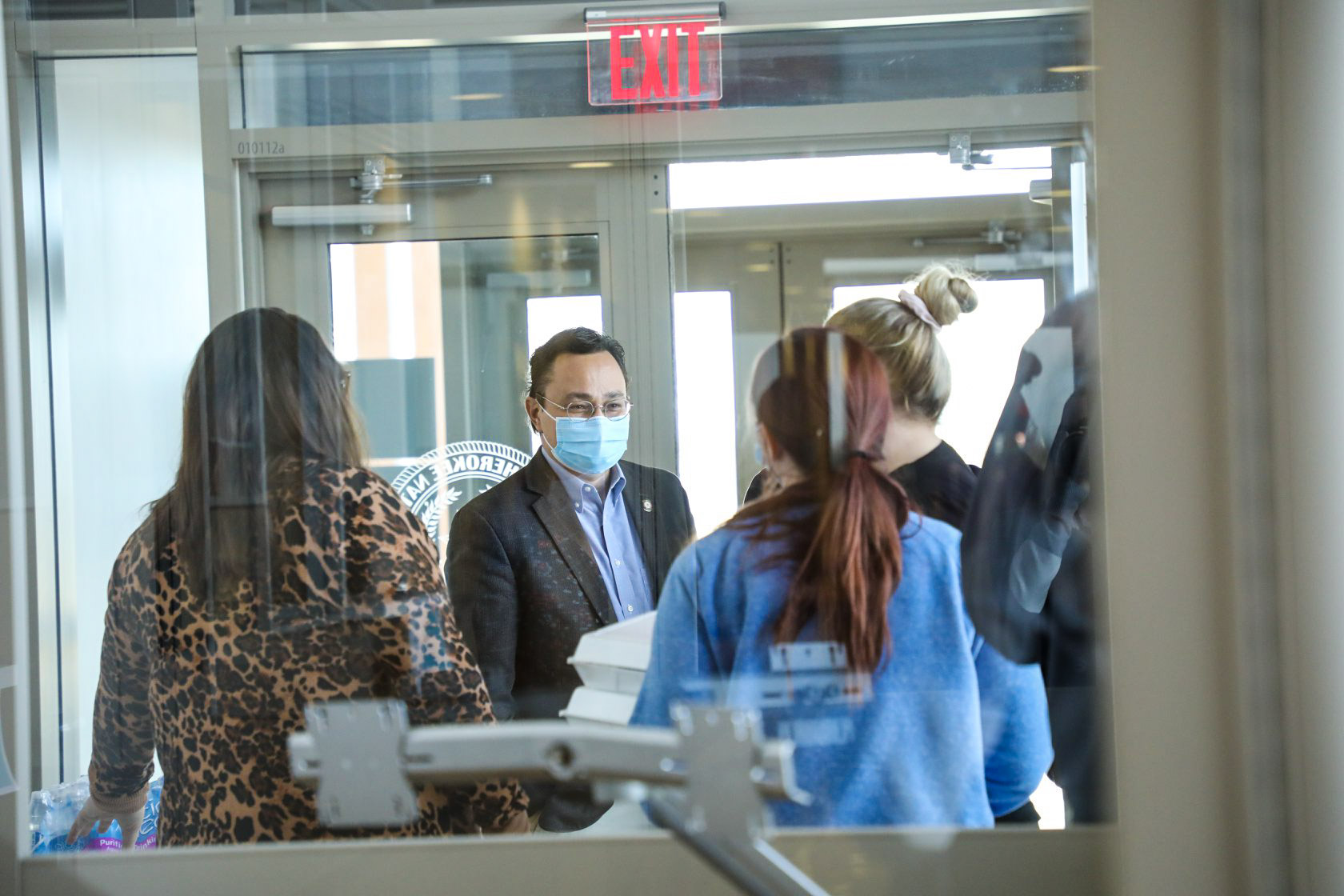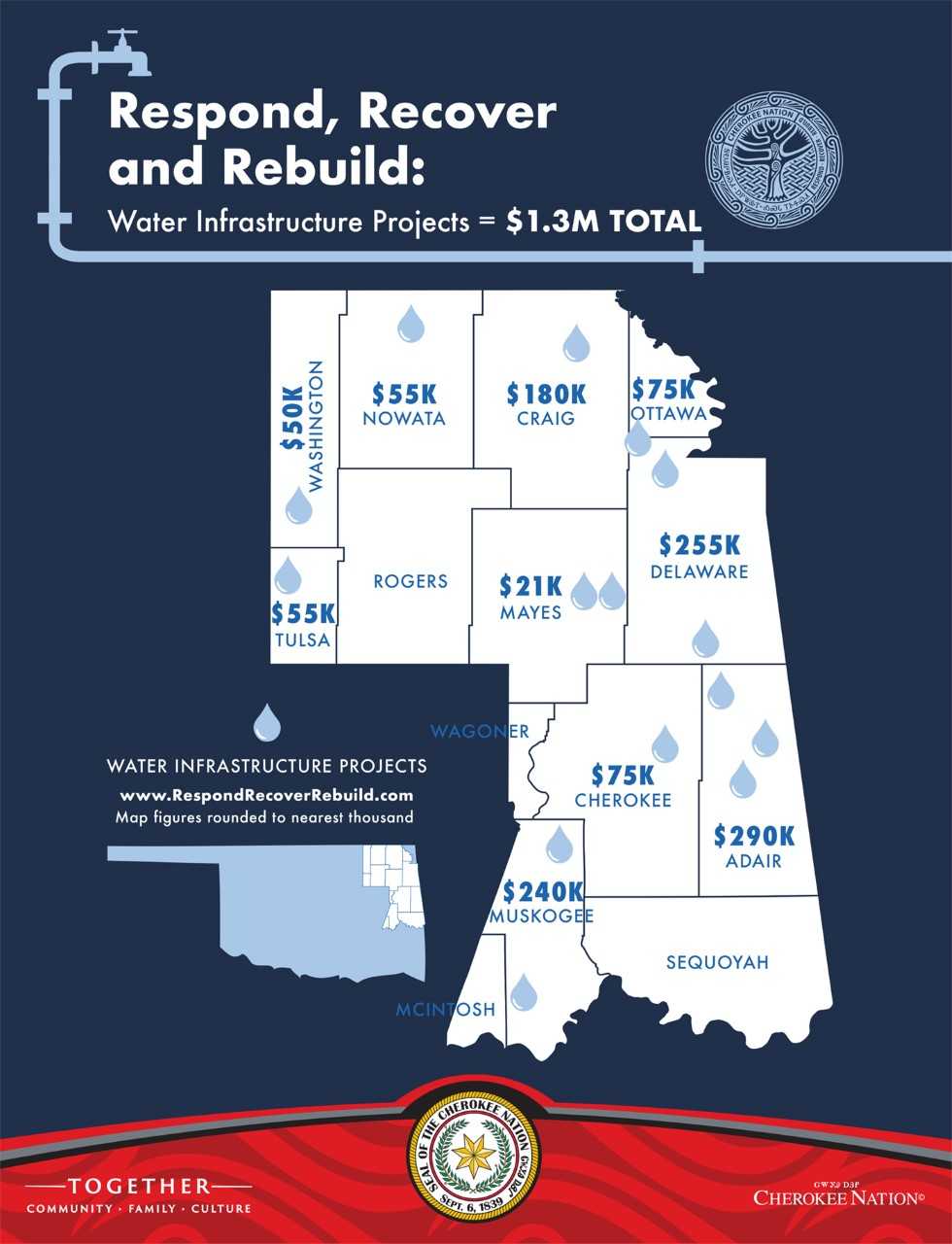Indianz.Com > News > Chuck Hoskin: Cherokee Nation invests in clean water amid COVID-19

Cherokee Nation invests in clean, accessible water across the reservation
Monday, March 1, 2021
Cherokee Nation
From historic floods and damaging winter storms to the COVID-19 pandemic, the past few years have put our communities to the test. We made it through these disasters thanks to heroic efforts by Cherokees and many others on our reservation in northeast Oklahoma, but they have also exposed gaps in our essential infrastructure.
Through these challenges, we have seen dramatic illustrations of how much public health and safety depend on clean, accessible water systems. That’s why Cherokee Nation has invested almost $1.5 million over the past year in improving water delivery systems across northeast Oklahoma.
Funding from the federal CARES Act has enabled us to ensure safer water for hundreds of households across Cherokee Nation. Our tribal government has collaborated with city and county governments to protect and repair essential infrastructure and increase capacity in local water systems. These investments not only help us respond to recent emergencies, they will improve the lives of both Cherokee and non-Cherokee people on our reservation for years to come.

Water infrastructure projects are also an opportunity to create jobs and to build better partnerships with our neighbors on the Cherokee reservation. Cherokee Nation is well-known as an essential partner for the local and municipal communities within our boundaries. Together we are helping to grow the whole region, ensuring that northeast Oklahoma remains a great place to live and to raise a family.
These investments were an important part of our overall pandemic response, which included direct assistance to elders and struggling families, job protection and job training, health care, education, and more. We tried to strike a balance between meeting immediate emergency needs and helping Cherokees to rebuild and emerge from the crisis even stronger. To learn more about the ways Cherokee Nation has responsibly used federal CARES Act funding, please visit the Respond, Recover, Rebuild website at respondrecoverrebuild.com.Chuck Hoskin Jr. is the 18th elected Principal Chief of the Cherokee Nation, the largest Indian tribe in the United States. He is only the second elected Principal Chief of the Cherokee Nation from Vinita, the first being Thomas Buffington, who served from 1899-1903. Prior to being elected Principal Chief, Hoskin served as the tribe’s Secretary of State. He also formerly served as a member of the Council of the Cherokee Nation, representing District 11 for six years.
Search
Filed Under
Tags
More Headlines
AUDIO: The Alyce Spotted Bear and Walter Soboleff Commission’s Report on Native Children
VIDEO: The Alyce Spotted Bear and Walter Soboleff Commission’s Report on Native Children
Native America Calling: Charting the future of Native jazz
Native America Calling: Miss Indian World Kassie John
AUDIO: American Indian & Alaska Native Public Witness Hearing: Day 1, Afternoon Session
AUDIO: American Indian & Alaska Native Public Witness Hearing: Day 1, Morning Session
Senate Committee on Indian Affairs hosts discussion on Native children
Native America Calling: Is the sky the limit for tribal sovereignty?
Native America Calling: The economic strength — and responsibilities — of tribal wealth
AUDIO: Senate Committee on Indian Affairs Legislative Hearing to receive testimony on S. 465 & S. 2695
VIDEO: Senate Committee on Indian Affairs Legislative Hearing to receive testimony on S. 465 & S. 2695
AUDIO: Senate Committee on Indian Affairs Business Meeting to consider S. 616, S. 2868, S. 3022, H.R. 1240, S. 2796
VIDEO: Senate Committee on Indian Affairs Business Meeting to consider S. 616, S. 2868, S. 3022, H.R. 1240, S. 2796
NAFOA: 5 Things You Need to Know this Week
Chuck Hoskin: Cherokee Nation works to support autism in our community
More Headlines
VIDEO: The Alyce Spotted Bear and Walter Soboleff Commission’s Report on Native Children
Native America Calling: Charting the future of Native jazz
Native America Calling: Miss Indian World Kassie John
AUDIO: American Indian & Alaska Native Public Witness Hearing: Day 1, Afternoon Session
AUDIO: American Indian & Alaska Native Public Witness Hearing: Day 1, Morning Session
Senate Committee on Indian Affairs hosts discussion on Native children
Native America Calling: Is the sky the limit for tribal sovereignty?
Native America Calling: The economic strength — and responsibilities — of tribal wealth
AUDIO: Senate Committee on Indian Affairs Legislative Hearing to receive testimony on S. 465 & S. 2695
VIDEO: Senate Committee on Indian Affairs Legislative Hearing to receive testimony on S. 465 & S. 2695
AUDIO: Senate Committee on Indian Affairs Business Meeting to consider S. 616, S. 2868, S. 3022, H.R. 1240, S. 2796
VIDEO: Senate Committee on Indian Affairs Business Meeting to consider S. 616, S. 2868, S. 3022, H.R. 1240, S. 2796
NAFOA: 5 Things You Need to Know this Week
Chuck Hoskin: Cherokee Nation works to support autism in our community
More Headlines